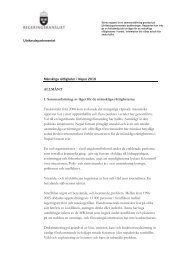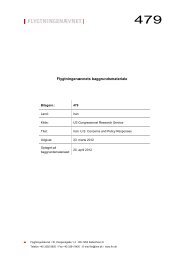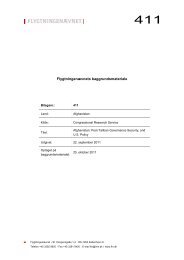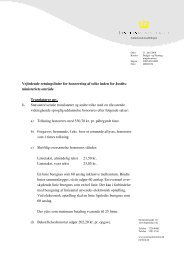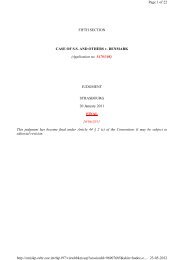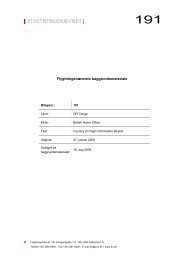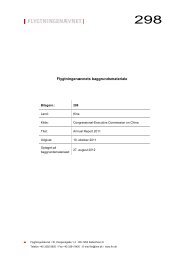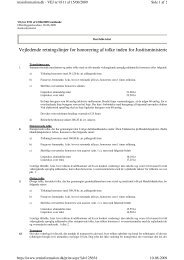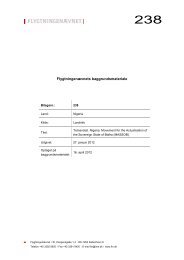- Page 1 and 2:
NATIONAL HUMAN RIGHTS COMMISSION An
- Page 3 and 4:
NATIONAL HUMAN RIGHTS COMMISSION An
- Page 5 and 6:
Contents 1 Introduction............
- Page 7 and 8:
Contents ○ ○ ○ ○ ○ ○
- Page 9 and 10:
Contents ○ ○ ○ ○ ○ ○
- Page 11 and 12:
Contents ○ ○ ○ ○ ○ ○
- Page 13 and 14:
Contents ○ ○ ○ ○ ○ ○
- Page 15 and 16:
Contents ○ ○ ○ ○ ○ ○
- Page 17 and 18:
Contents ○ ○ ○ ○ ○ ○
- Page 19 and 20:
Contents ○ ○ ○ ○ ○ ○
- Page 21 and 22:
○ ○ ○ ○ ○ ○ ○ ○ ○
- Page 23 and 24:
○ ○ ○ ○ ○ ○ ○ ○ ○
- Page 25 and 26:
An Overview ○ ○ ○ ○ ○ ○
- Page 27 and 28:
An Overview ○ ○ ○ ○ ○ ○
- Page 29 and 30:
○ ○ ○ ○ ○ ○ ○ ○ ○
- Page 31 and 32:
Civil Liberties ○ ○ ○ ○ ○
- Page 33 and 34:
Civil Liberties ○ ○ ○ ○ ○
- Page 35 and 36:
Civil Liberties ○ ○ ○ ○ ○
- Page 37 and 38:
Civil Liberties ○ ○ ○ ○ ○
- Page 39 and 40:
Civil Liberties ○ ○ ○ ○ ○
- Page 41 and 42:
Civil Liberties ○ ○ ○ ○ ○
- Page 43 and 44:
○ ○ ○ ○ ○ ○ ○ ○ ○
- Page 45 and 46:
Complaints Before the Commission
- Page 47 and 48:
Complaints Before the Commission
- Page 49 and 50:
Complaints Before the Commission
- Page 51 and 52:
Complaints Before the Commission
- Page 53 and 54:
Complaints Before the Commission
- Page 55 and 56:
Complaints Before the Commission
- Page 57 and 58:
Complaints Before the Commission
- Page 59 and 60:
Complaints Before the Commission
- Page 61 and 62:
Complaints Before the Commission
- Page 63 and 64:
Complaints Before the Commission
- Page 65 and 66:
Complaints Before the Commission
- Page 67 and 68:
Complaints Before the Commission
- Page 69 and 70:
Complaints Before the Commission
- Page 71 and 72:
Complaints Before the Commission
- Page 73 and 74:
Complaints Before the Commission
- Page 75 and 76:
Complaints Before the Commission
- Page 77 and 78:
Complaints Before the Commission
- Page 79 and 80:
Complaints Before the Commission
- Page 81 and 82:
Complaints Before the Commission
- Page 83 and 84:
Complaints Before the Commission
- Page 85 and 86:
Complaints Before the Commission
- Page 87 and 88:
Complaints Before the Commission
- Page 89 and 90:
Complaints Before the Commission
- Page 91 and 92:
Complaints Before the Commission
- Page 93 and 94:
Complaints Before the Commission
- Page 95 and 96:
Complaints Before the Commission
- Page 97 and 98:
Complaints Before the Commission
- Page 99 and 100:
Complaints Before the Commission
- Page 101 and 102:
Economic, Social and Cultural Right
- Page 103 and 104:
○ ○ ○ ○ ○ ○ ○ ○ ○
- Page 105 and 106:
Rights of the Disabled ○ ○ ○
- Page 107 and 108:
Rights of the Disabled ○ ○ ○
- Page 109 and 110:
Rights of the Disabled ○ ○ ○
- Page 111 and 112:
Rights of the Disabled ○ ○ ○
- Page 113 and 114:
○ ○ ○ ○ ○ ○ ○ ○ ○
- Page 115 and 116:
Food Security ○ ○ ○ ○ ○
- Page 117 and 118:
Food Security ○ ○ ○ ○ ○
- Page 119 and 120:
○ ○ ○ ○ ○ ○ ○ ○ ○
- Page 121 and 122:
Right to Health ○ ○ ○ ○ ○
- Page 123 and 124:
Right to Health ○ ○ ○ ○ ○
- Page 125 and 126:
Right to Health ○ ○ ○ ○ ○
- Page 127 and 128:
Right to Health ○ ○ ○ ○ ○
- Page 129 and 130:
Right to Health ○ ○ ○ ○ ○
- Page 131 and 132:
Right to Health ○ ○ ○ ○ ○
- Page 133 and 134:
Right to Health ○ ○ ○ ○ ○
- Page 135 and 136:
○ ○ ○ ○ ○ ○ ○ ○ ○
- Page 137 and 138:
Rights of Women and Children ○
- Page 139 and 140:
Rights of Women and Children ○
- Page 141 and 142:
Rights of Women and Children ○
- Page 143 and 144:
Rights of Women and Children ○
- Page 145 and 146:
Rights of Women and Children ○
- Page 147 and 148:
Rights of Women and Children ○
- Page 149 and 150:
Rights of Women and Children ○
- Page 151 and 152:
Rights of Women and Children ○
- Page 153 and 154:
○ ○ ○ ○ ○ ○ ○ ○ ○
- Page 155 and 156:
Scourge of Bonded Labour ○ ○
- Page 157 and 158:
Scourge of Bonded Labour ○ ○
- Page 159 and 160:
Scourge of Bonded Labour ○ ○
- Page 161 and 162:
Scourge of Bonded Labour ○ ○
- Page 163 and 164:
○ ○ ○ ○ ○ ○ ○ ○ ○
- Page 165 and 166:
Rights of the Vulnerable ○ ○
- Page 167 and 168:
Rights of the Vulnerable ○ ○
- Page 169 and 170:
○ ○ ○ ○ ○ ○ ○ ○ ○
- Page 171 and 172:
Internally Displaced Persons ○
- Page 173 and 174:
Internally Displaced Persons ○
- Page 175 and 176:
○ ○ ○ ○ ○ ○ ○ ○ ○
- Page 177 and 178:
Research Studies and Projects ○
- Page 179 and 180:
Research Studies and Projects ○
- Page 181 and 182:
Research Studies and Projects ○
- Page 183 and 184:
Research Studies and Projects ○
- Page 185 and 186:
Research Studies and Projects ○
- Page 187 and 188:
Research Studies and Projects ○
- Page 189 and 190:
○ ○ ○ ○ ○ ○ ○ ○ ○
- Page 191 and 192:
Promotion of Human Rights Literacy
- Page 193 and 194:
Promotion of Human Rights Literacy
- Page 195 and 196:
Promotion of Human Rights Literacy
- Page 197 and 198:
○ ○ ○ ○ ○ ○ ○ ○ ○
- Page 199 and 200:
International Cooperation ○ ○
- Page 201 and 202:
○ ○ ○ ○ ○ ○ ○ ○ ○
- Page 203 and 204:
○ ○ ○ ○ ○ ○ ○ ○ ○
- Page 205 and 206:
○ ○ ○ ○ ○ ○ ○ ○ ○
- Page 207 and 208:
A Review of Laws ○ ○ ○ ○
- Page 209 and 210:
A Review of Laws ○ ○ ○ ○
- Page 211 and 212:
○ ○ ○ ○ ○ ○ ○ ○ ○
- Page 213 and 214:
Administration and Logistic Support
- Page 215 and 216:
○ ○ ○ ○ ○ ○ ○ ○ ○
- Page 217 and 218:
Summary of Principal Recommendation
- Page 219 and 220:
Summary of Principal Recommendation
- Page 221 and 222:
Summary of Principal Recommendation
- Page 223 and 224:
Summary of Principal Recommendation
- Page 225 and 226:
Summary of Principal Recommendation
- Page 227 and 228:
Summary of Principal Recommendation
- Page 229 and 230:
Summary of Principal Recommendation
- Page 231 and 232:
Annexure - 1&5 Paras 3.29 & 4.3 Sta
- Page 233 and 234:
Annexure - 3 (a) Paras 4.1 & 4.5 St
- Page 235 and 236:
Annexure - 3 (c) Paras 4.1 & 4.5 St
- Page 237 and 238:
Annexure - 4 (b) Para 4.2 Statement
- Page 239 and 240:
Annexure 6 ○ ○ ○ ○ ○ ○
- Page 241 and 242:
○ ○ ○ ○ ○ ○ ○ ○ ○
- Page 243 and 244:
Annexure 6 ○ ○ ○ ○ ○ ○
- Page 245 and 246:
Annexure 8 Para 7.16 Recommendation
- Page 247 and 248:
○ ○ ○ ○ ○ ○ ○ ○ ○
- Page 249 and 250:
Annexure 8 ○ ○ ○ ○ ○ ○
- Page 251 and 252:
Annexure 8 ○ ○ ○ ○ ○ ○
- Page 253 and 254:
○ ○ ○ ○ ○ ○ ○ ○ ○
- Page 255 and 256:
Annexure 8 ○ ○ ○ ○ ○ ○
- Page 257 and 258:
Annexure 8 ○ ○ ○ ○ ○ ○
- Page 259 and 260:
Annexure 8 ○ ○ ○ ○ ○ ○
- Page 261 and 262:
Annexure 8 ○ ○ ○ ○ ○ ○
- Page 263 and 264:
Annexure 8 ○ ○ ○ ○ ○ ○
- Page 265 and 266:
Annexure 8 ○ ○ ○ ○ ○ ○
- Page 267 and 268:
Annexure 8 ○ ○ ○ ○ ○ ○
- Page 269 and 270:
Annexure 8 ○ ○ ○ ○ ○ ○
- Page 271 and 272:
Annexure 8 ○ ○ ○ ○ ○ ○
- Page 273 and 274:
Annexure 8 ○ ○ ○ ○ ○ ○
- Page 275 and 276:
Annexure 8 ○ ○ ○ ○ ○ ○
- Page 277 and 278:
Annexure 9 ○ ○ ○ ○ ○ ○
- Page 279 and 280:
Annexure 10 ○ ○ ○ ○ ○ ○
- Page 281 and 282:
Annexure 10 ○ ○ ○ ○ ○ ○
- Page 283 and 284:
Annexure 10 ○ ○ ○ ○ ○ ○
- Page 285 and 286:
Annexure 11(a) Para 10.7 Letter of
- Page 287 and 288:
Annexure 11(c) Para 10.7 D.O.No.20/
- Page 289 and 290:
Annexure 12 Para 12.6 Recommendatio
- Page 291 and 292:
Annexure 12 ○ ○ ○ ○ ○ ○
- Page 293 and 294:
Annexure 12 ○ ○ ○ ○ ○ ○
- Page 295 and 296: Annexure 12 ○ ○ ○ ○ ○ ○
- Page 297 and 298: Annexure 12 ○ ○ ○ ○ ○ ○
- Page 299 and 300: Annexure 12 ○ ○ ○ ○ ○ ○
- Page 301 and 302: Annexure 12 ○ ○ ○ ○ ○ ○
- Page 303 and 304: Annexure 12 ○ ○ ○ ○ ○ ○
- Page 305 and 306: Annexure 12 ○ ○ ○ ○ ○ ○
- Page 307 and 308: Annexure 12 ○ ○ ○ ○ ○ ○
- Page 309 and 310: Annexure 12 ○ ○ ○ ○ ○ ○
- Page 311 and 312: Annexure 12 ○ ○ ○ ○ ○ ○
- Page 313 and 314: Annexure 12 ○ ○ ○ ○ ○ ○
- Page 315 and 316: Annexure 12 ○ ○ ○ ○ ○ ○
- Page 317 and 318: Annexure 12 ○ ○ ○ ○ ○ ○
- Page 319 and 320: Annexure 12 ○ ○ ○ ○ ○ ○
- Page 321 and 322: Annexure 12 ○ ○ ○ ○ ○ ○
- Page 323 and 324: Annexure 12 ○ ○ ○ ○ ○ ○
- Page 325 and 326: ○ ○ ○ ○ ○ ○ ○ ○ ○
- Page 327 and 328: Annexure 13 ○ ○ ○ ○ ○ ○
- Page 329 and 330: Annexure 14 ○ ○ ○ ○ ○ ○
- Page 331 and 332: Annexure 14 ○ ○ ○ ○ ○ ○
- Page 333 and 334: Annexure 14 ○ ○ ○ ○ ○ ○
- Page 335 and 336: Annexure 15 ○ ○ ○ ○ ○ ○
- Page 337 and 338: Annexure 16 Para 1 4.8 Statement of
- Page 339 and 340: Annexure 16 ○ ○ ○ ○ ○ ○
- Page 341 and 342: Annexure 16 ○ ○ ○ ○ ○ ○
- Page 343 and 344: Annexure 16 ○ ○ ○ ○ ○ ○
- Page 345: Annexure 17 ○ ○ ○ ○ ○ ○
- Page 349 and 350: Annexure 17 ○ ○ ○ ○ ○ ○
- Page 351 and 352: Annexure 18 Para 17.5 Letters from
- Page 353 and 354: Annexure 19 Para 17.5 Letter from t
- Page 355 and 356: Annexure 19 ○ ○ ○ ○ ○ ○
- Page 357 and 358: State wise List of Cases Registered
- Page 359 and 360: Nature and Categorisation of the Ca
- Page 361 and 362: Cases Dismissed in limini During th
- Page 363 and 364: National Human Rights Commission An



